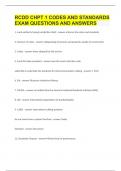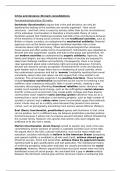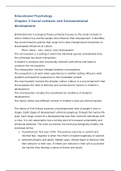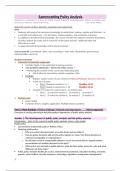Lecture 13 - Governance
beyond the nation state
1: What is international and transnational governance
Governance is increasing dependence state and non-state actors in dealing with
public interest and the appearance of new modes of governing, for example
‘New Public Governance’.
After all, there is a broader perspective of governance needed for commons
problems across borders. So:
Governance might also mean collaborations between the states
We might also witness groups of states collaborating with non-state actors.
The states might need companies.
Globalization = ‘transborder interactions that include the whole world system’
(Hale & Held)
or
‘Intensified version of interdependence between states driven by economic
liberalization and increasing cross-border transactions between private actors’
(Knill & Tosun)
Knill and Tosun mainly focus on nation-states involved in public policies. → But
this does not exclude private actors, because they are simply involved with
public policy.
There are two varieties of governance:
International governance: State to state interaction (Hale and Held)
Transnational governance: Forms of interaction that ‘cross national
boundaries at levels other than sovereign-to-sovereign’ → involvement of
private actors.
2: International Governance
Lecture 13 - Governance beyond the nation state 1
, Why do we have international governance?
1. The scale of the problems is changing → we need global politics because of
depletion of resources or epidemics.
2. States are economically more dependent of eachother through common
markets. → EU or Nafta illustrate this
3. Historical developments which lead to international governance. → WW2
and will of cooperation
There are some different forms of international cooperation
1. International organizations (treaties and legal personality)
2. International regimes (treaties but no legal personality or admin staff)
3. Coalitions or groupings of states → to take care of a problem
Different geographical scopes of governance
Four patterns:
Global scope → UN
Regional scope → EU, African Union
Cultural scope → Nordic council
Functional scope → formation of coalition because of problemetic
circumstances
Governance can be practiced in different policy sectors
Broad spectrum → UN
Narrow spectrum focusses more on one policy domain
International governance is clustered in sectors (security, economic
regulation, technical standardization)
Beginning of the EU, Robert Schuman, Schuman declaration
Lecture 13 - Governance beyond the nation state 2
beyond the nation state
1: What is international and transnational governance
Governance is increasing dependence state and non-state actors in dealing with
public interest and the appearance of new modes of governing, for example
‘New Public Governance’.
After all, there is a broader perspective of governance needed for commons
problems across borders. So:
Governance might also mean collaborations between the states
We might also witness groups of states collaborating with non-state actors.
The states might need companies.
Globalization = ‘transborder interactions that include the whole world system’
(Hale & Held)
or
‘Intensified version of interdependence between states driven by economic
liberalization and increasing cross-border transactions between private actors’
(Knill & Tosun)
Knill and Tosun mainly focus on nation-states involved in public policies. → But
this does not exclude private actors, because they are simply involved with
public policy.
There are two varieties of governance:
International governance: State to state interaction (Hale and Held)
Transnational governance: Forms of interaction that ‘cross national
boundaries at levels other than sovereign-to-sovereign’ → involvement of
private actors.
2: International Governance
Lecture 13 - Governance beyond the nation state 1
, Why do we have international governance?
1. The scale of the problems is changing → we need global politics because of
depletion of resources or epidemics.
2. States are economically more dependent of eachother through common
markets. → EU or Nafta illustrate this
3. Historical developments which lead to international governance. → WW2
and will of cooperation
There are some different forms of international cooperation
1. International organizations (treaties and legal personality)
2. International regimes (treaties but no legal personality or admin staff)
3. Coalitions or groupings of states → to take care of a problem
Different geographical scopes of governance
Four patterns:
Global scope → UN
Regional scope → EU, African Union
Cultural scope → Nordic council
Functional scope → formation of coalition because of problemetic
circumstances
Governance can be practiced in different policy sectors
Broad spectrum → UN
Narrow spectrum focusses more on one policy domain
International governance is clustered in sectors (security, economic
regulation, technical standardization)
Beginning of the EU, Robert Schuman, Schuman declaration
Lecture 13 - Governance beyond the nation state 2










